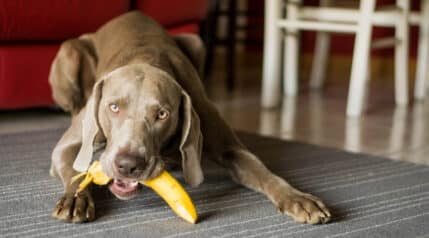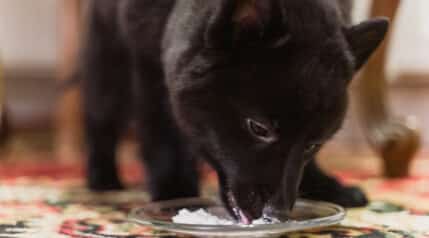Dogs are very curious and inquisitive creatures. They often seek to investigate new objects they find and usually will use their nose and mouth! This means dogs will commonly pick up various things around the house and garden. But what happens when your dog eats rabbit poop from your backyard?
There are several reasons why feces can actually be quite tempting for our canine companions to eat. It’s not uncommon for dogs to eat cat poop or even their own. But what’s the main factor behind this extremely odd behavior?
We explore what can happen if your pup ate rabbit feces. We will look at what you can expect as a dog owner and when you should contact your veterinarian.
Why Do Dogs Eat Rabbit Droppings?

To a dog, the poop of another animal will always smell really interesting, so it is not unusual for dogs to pick it up and swallow it! Poop contains a wide variety of aromas, even for humans. Just imagine how aromatic it is for a nose as sensitive as a dog’s.
There are the smells of the content itself, its bacterial life, and the smells of the rabbit to explore. It even comes in a convenient size for a dog to eat and is often found away from where their pet parent can take it away from them! All of this makes rabbit poop a perfect snack for a dog.
Can Rabbit Droppings Make My Dog Sick?

Rabbit droppings are largely made up of digested grass, green plants, and vegetables, with a sprinkling of rabbit fur and bacteria and a seasoning of intestinal mucus. These in themselves are usually not overly dangerous for a dog. So, in most cases eating small amounts of rabbit poop will not cause a problem. However, you may not want your canine companion to lick your face for a little while!
Rabbit droppings can, in some cases, contain potentially problematic germs that can cause an upset stomach. Poop is also always a potential source of parasites like worms. These are especially a concern if your dog already has a sensitive tummy or has pre-existing health conditions. Rabbit feces is more likely to carry germs if it comes from wild rabbits rather than household pets.
While most dogs will not have a problem after eating rabbit droppings, some may develop tummy problems, which may need veterinary attention. It is important to note that many of the germs and parasites that can pass from rabbit to dog can also pass to humans. So, do be careful about your own hygiene and health. Make sure you wash your hands with soap!
Eating rabbit feces isn’t the end of the world for your pup, but if he starts showing any symptoms of ill health in the week or so afterward, it is worth discussing the situation with your veterinarian.
My Dog Ate Rabbit Poop: What Now?

If Fido just recently ate some rabbit feces, there are a few steps you can take. By following these steps, you’ll be sure that your veterinarian has all the information they need and that your pup will be in a good place to take whatever action your vet recommends.
Step 1: Secure Your Dog
Get your pup away from the source of the rabbit droppings so that no more can be swallowed. Try and remove any from your dog’s mouth if it is safe to do so.
Step 2: Analyze What’s Been Consumed
Try and work out roughly what’s been eaten and make a note of the time. For example, it is useful to know if it is pet rabbit droppings or wild rabbit droppings that have been eaten.
Step 3: Call Your Veterinarian
Follow the advice of the veterinary clinic. They may advise you to continue managing your dog at home. But if the symptoms are concerning, or if your dog has pre-existing health conditions like a sensitive tummy, then the professional advice may be to come in and have a health check with the veterinarian.
Step 4: Follow Your Vet’s Advice
Monitor your canine companion closely over the following 24 hours. You can treat them as normal, but if any symptoms of ill health develop, then contact your local veterinary clinic for advice.
What Happens Next?

Rabbit poop can contain various nasty germs that can upset a dog’s stomach. In the week after rabbit droppings are eaten, you might see your dog become lethargic, eat less, and have vomiting and diarrhea. This is more likely if they have a sensitive stomach or other pre-existing conditions like pancreatitis. If any of these symptoms start after eating rabbit feces, make sure you contact your local veterinary clinic for advice.
In general, the tummy upsets associated with rabbit droppings are likely to be short-lived. Your pup will likely be ill only for a few short days. Most dogs will recover without trouble. That said, some of the bugs and parasites in rabbit feces can cause prolonged problems. These problems may include chronic diarrhea lasting several weeks or more.
These infections are rare and are not associated regularly with rabbits, but theoretically, rabbit poo can pass on various bugs that can cause longer-term issues. Bear in mind many of these infections are “zoonotic”—they can pass to people too, so take care over hygiene.
How Will The Vet Treat My Dog?

In most cases, your dog will show no symptoms of ill health and can be treated as normal. Some dogs will get a mild tummy upset for a few days. If this happens, it is sensible to feed them a bland diet (boiled chicken and rice, for example), given little and often. As long as your dog is still bright and eating reasonably, then these cases can be managed well at home.
If your dog is really struggling with vomiting and diarrhea or is not eating for more than a day or so, it is important to seek professional veterinary care. Equally, if you notice any symptoms like diarrhea that persist for more than a week, seeking veterinary help is also sensible.
Typically, if a dog is poorly and not eating after eating rabbit poop, then a veterinarian will recommend symptomatic and supportive care targeted at reducing nausea and relieving any tummy pain. Some dogs that are dehydrated may need short-term hospitalization for intravenous fluids to rehydrate them.
Your veterinarian may suggest a blood test or imaging (ultrasound or X-ray) of the tummy if your dog is very sick, but in most cases, these will not be necessary. These more intensive therapies are more likely to be employed if a pre-existing condition is present. Pre-existing conditions have a tendency to make illnesses worse.
If a dog is showing signs of longer-term, chronic issues, then your veterinarian may recommend investigations. These might include a blood test, tummy imaging, or, most likely, a fecal sample sent to a lab to look for parasites like salmonella, giardia, and worms.
In my experience in practice, it is unusual to see clinical symptoms after eating rabbit poop, but those that do come in tend to recover well with just a little help. In rare cases, a fecal sample has discovered something more that could have come from the rabbit feces. That said, the vast majority of these infections from rabbit feces are manageable and treatable. But they all require different specific treatments, so an accurate diagnosis is essential.
Could Pet Insurance Help?
If your pet insurance covers exam fees and your dog needs examination, there is a good chance your policy will reimburse those costs based on your policy details. However, if you are a new customer, vet expenses will not be covered until after your policy’s defined waiting periods, so signing up once you have an existing health concern is not going to help this time. Pre-existing conditions are not covered by any current pet insurance plans.
This is why it is a great idea to sign up for a pet insurance policy when your pet is young and relatively healthy to ensure you will be covered when you need it most.
Will My Dog Be Okay?

The vast majority of dogs will make a complete recovery within a week or so after eating rabbit poop. Those with longer-term symptoms are also likely to recover eventually. But they will need the help of a veterinarian to get an accurate diagnosis and accurate treatment.
Preventing Rabbit Feces Ingestion
If rabbit poop and other interesting-smelling objects are a regular problematic habit, then one sensible option is to train your pup to accept a basket muzzle. This will allow them to breathe easily and pant but not allow them to eat things while out and about. Appropriate training is also a good idea and always something to work on. All dogs should have a “leave” command, for example.
If wild rabbit droppings are the issue, then it may be worth looking for walks and routes that avoid the densest rabbit populations. This should help you avoid poop altogether.
If pet rabbit droppings are the issue, it may be worth trying to separate the living spaces of your rabbit and your pup. This will help to keep the rabbit feces away from your curious canine. If you live in the countryside and wild rabbits are in your yard, you may need to look through your yard before letting Fido outside.
Frequently Asked Questions
Can dogs catch salmonella from rabbit poop?
Healthy rabbits can be carriers for salmonella bacteria, just as healthy dogs can. There is a potential risk that salmonella can pass on via almost any mammal feces, and salmonella can cause long-term diarrhea in dogs.
Can dogs catch worms from rabbit poop?
Rabbits do not suffer from worms as commonly as dogs and cats do, but they can still pass roundworms and tapeworms on to dogs. The most likely one for them to carry is the pinworm. Dogs can also pass worms back to rabbits. This is another good reason to pick up your dog’s poop too! Dogs need treatment for worms at least quarterly in any case.
Can dogs catch Giardia from rabbit poop?
Giardia is a protozoal parasite, meaning it is neither a bacterium nor a worm but something in the middle. Giardia is thought to be a normal part of the life in a rabbit’s gut and does not typically cause them problems. Rabbit poo would not commonly pass on giardia, but it is possible. Giardia causes chronic gut irritation and prolonged diarrhea in dogs.
Final Thoughts
Rabbit poop is a common thing to find out about and is often irresistible for inquisitive dogs. In most cases, eating rabbit feces will not cause any harm to our canine companions. But if Fido has pre-existing health conditions or eats a large amount of poop, then it can cause illnesses.
Most cases will have a mild tummy upset for a few days and make a full recovery. In some cases, these tummy upsets can be more severe and can require veterinary attention.
Rabbit poop can also rarely pass on chronic tummy infections like worms, giardia, and salmonella, which, again, all require a specific diagnosis and treatment from your veterinarian. Remember, lots of these problems can affect people too, so make sure your own hygiene is up to scratch!






My dog Buttercup ate a few cottontail poop in our backyard. A day later she had diarrhea only needed to poop every hour. He poop was runny, but very soft and stringy. Today she seem to look better and already ate twice.
earlier i had went out to my back yard to feed the birds and bunnies we have out there. my dog betty lou went out with me. while i was doing that she had eaten rabbit droppings. she vomited a while after her and i came back in and that’s when my husband and i saw the rabbit droppings she ate. she’s drank a little water so that’s good. betty lou has not ever ate rabbit droppings before. we are keeping a close eye on her if any changes for the worse she will go to the dr. any advice that we should do? thank you.